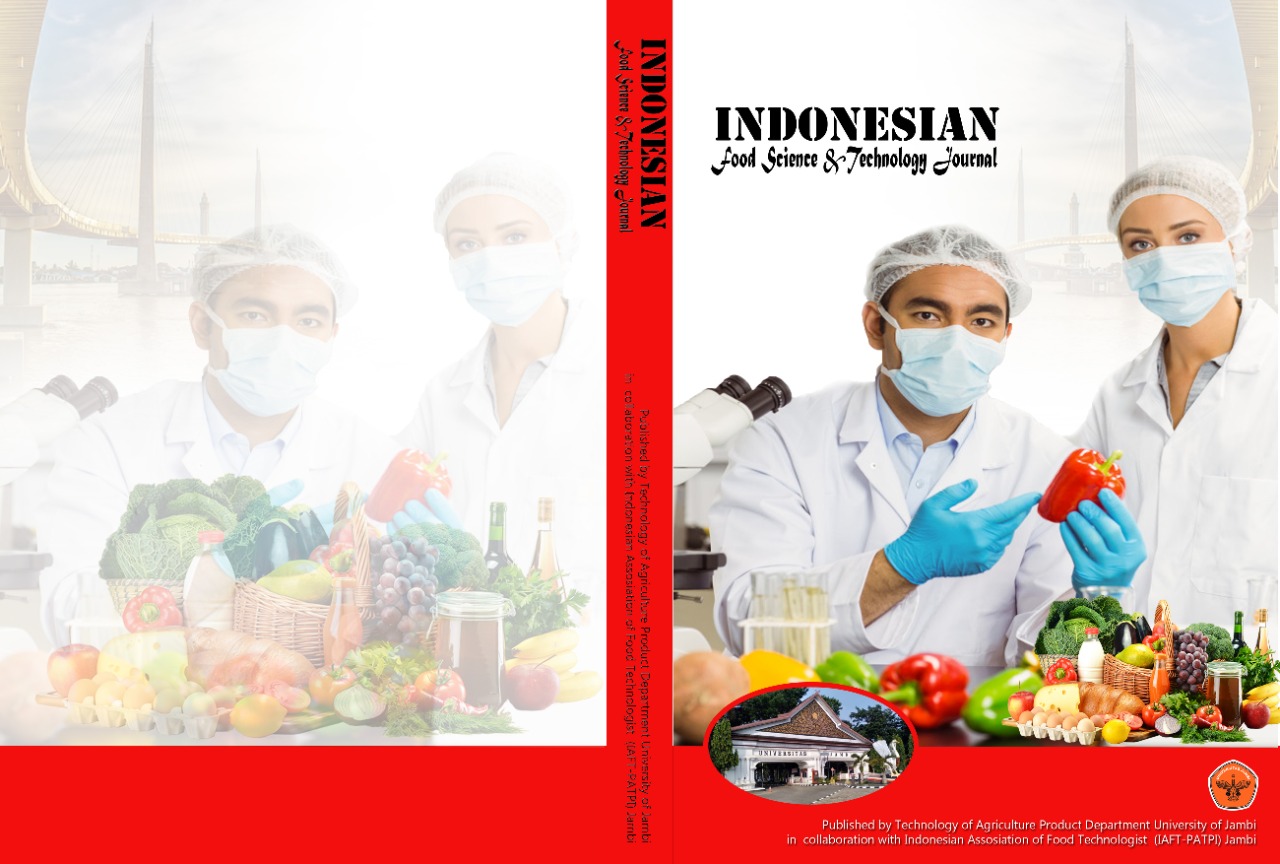The Influence of Fermentation Conditions on The Antioxidant and Physico-Chemical of Arabica Coffee from Kerinci Region of Indonesia
DOI:
https://doi.org/10.22437/ifstj.v5i1.17383Keywords:
Anaerobic fermentation, coffee processing, antioxidantAbstract
Abstract—Coffee quality can depend on several factors such as the species/varieties cultivated, the processing after the harvesting phase, geographical origin, and climatic factors. Fermentation is one of the post harvest technology that influence coffee chemical and sensory properties. This study was to determine the effect of fermentation time into antioxidant and physicochemical of Arabica coffee from Kerinci region Indonesia. Research design used was randomized complete design with 5 combinations of treatments, which are 12, 20, 28, 36, and 44 hours fermentation with 3 replicates. The results shows fermentation time have a significant effects on moisture content, pH, antioxidant activity. The duration of fermentation results in increasing higher moisture content, lower pH value and decreased antioxidants.
- Keywords— Anaerobic fermentation, coffee processing, antioxidan
Downloads
References
ICO. Trade statistics. (2018). http://www.ici.org/trade_statistics.asp Accessed 1 October 2020.
Soenaryo dan Ismayadi. (1988). Pengolahan kopi secara basah. Balai penelitian perkebunan. Jember.
Megah. A.F.Z. Syakbaniah dan Ratnawulan, 2009. Perbandingan karakteristik fisis kopi Luwak (Civet Coffee) dan kopi biasa jenis arabika. Fillar of Physics, Vol2.
Lembaga Tumbuh Alami Kerinci. (2014). Aroma arabika “koerintji kopiâ€. (http://kpshk.org/2014/05/14/aroma-arabika-koerintji-kopi/) Access 17 January 2019.
Balya F. B, S. Suwasono, Djumartin. (2013). Karakteristik fisik dan organoleptik biji kopi arabika hasil pengolahan semi basah dengan variasi jenis wadah dan lama fermentasi (studi kasus di desa pedati dan sukosawah kabupaten bondowoso). Jurusan Teknologi Hasil Pertanian Universitas Jember. Jember.
AOAC. (2005). Official methods of analysis (18th ed.). Washington, DC, USA: Association of Official Analytical Chemist.
Selvi A T, G S Joseph and Jayaprakarsa G K. (2003). Inhibition of growth and aflatoxin production in aspergillus flavus by garcinia indica extract and its antioxidant activity. J. food microbiology 20: 455-460.
Dewi, Hastuti Susanti, Silana agustian. (2013). Aktivitas antioksidan ,kadar fenolik total dan kadar kafein pada fermentasi kombu kopi robusta dalam berbagai konsentrasi gula. Universitas Kristen satya wacana. Salatiga.
Madigan, M T dan Martinko J M. (2006). Brock biology of microorganisms. Eleventh edition. Perarson prentice-Hall. Inc. New Jersey. Hal 143, 934, 967.
Apak, R., K Guclu, B. Demirata, M. Ozyurek, S.E Celik, B. Bectasoglu, K.I. Berker, and D Ozyurt. 2007. Comparative evaluation of various total antioxidant capacity assays applied to phenolic compounds with the cupric assay. Molecules vol 12: 14961547
Hadipernata M, Nugraha S. (2012). Identifikasi fisik, kimia dan mikrobiologi biji kopi luwak sebagai dasar acuan teknologi proses kopi luwak artificial. J Kementer Pertan. 372:117-121
Megah. A.F.Z. Syakbaniah dan Ratnawulan, (2009). Perbandingan karakteristik fisis kopi Luwak (Civet Coffee) dan kopi biasa jenis arabika. Fillar of Physics, Vol2.
Wilujeng, A.A.T dan Wikandari, P.R. (2013). Pengaruh lama fermentasi kopi arabika dengan bakteri asam laktat terhadap mutu produk. j. of chemistry unesa. 2:1-9 Yusriah.
Wills R.B.H, Mc Glasson, B graham, and Joye. (1998). Postharvest, introductionto the physiology and handling of fruit, vegetables and ornamentals, Sydney. University of new south wales.
Fardiaz, S. (1992). Mikrobiologi pangan I. PT. Gramedia Pustaka Utama. Jakarta. 320
Oktadina Fiona Drefin, Bambang Dwi Argo, M. Bagus Hermanto. (2013). Pemanfaatan nanas (ananas comosus l. merr) untuk penurunan kadar kafein dan perbaikan citarasa kopi (coffea sp) dalam pembuatan kopi bubuk. Universitas Brawijaya. Malang.
Fauzi Muhammad, Giyarto, Wijayani reza. (2015). Karakteristik kimia biji kopi robusta hasil fermentasi menggunakan mikroflora asal feses luwak. univeristas jember. jember.
Tawali abu B, Abdullah nurlailah, Wiranata benni. (2013). Pengaruh fermentasi menggunakam bakteri asam laktat yoghurt terhadap citarasa kopi robusta (coffea robusta). Universitas Hasanuddin. Makasar
Ananda A D. (2009). Aktivitas antioksidan dan karakteristik organoleptik minuman fungsional the hijau rempah instan. Fakultas pertanian. Institut Pertanian Bogor. Bogor.
Downloads
Published
How to Cite
Issue
Section
License
Copyright (c) 2021 Daniel Tua Purba, Addion Nizori, Elkanah Jayanti, Surhaini, Surhaini, Ika Gusriani, Mursyid

This work is licensed under a Creative Commons Attribution 4.0 International License.








